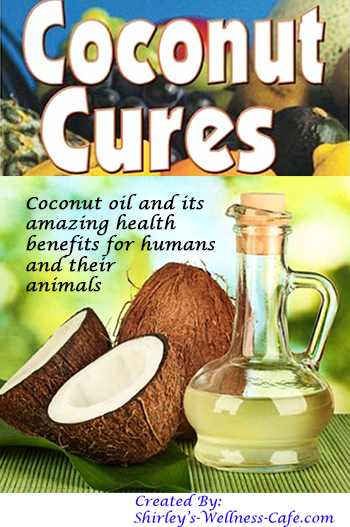Facts About Coconut Oil
The United States leads the world in condemning coconut oil as a dietary oil,
even though it has been a part of traditional cultures for thousands of years,
and the attack against coconut oil continues through the present time. Over 1,400 studies
on the health benefits of coconut indicates that coconut oil is one of the healthiest superfood on the planet for both humans and pets.
Coconut oil is easy to digest, produces a longer sustained
energy, boosts your metabolism, stimulates the thyroid, help you maintain a healthy weight,
has antimicrobial and antifungal properties and many more health benefits.
Coconut oil is high in natural saturated fats. Saturated fats not only
increase the healthy cholesterol (known as HDL) in your body,
but also help to convert the LDL “bad” cholesterol into good cholesterols.
 Coconut oil benefits and uses go beyond what most people realize. When coconut oil was fed as 7% of energy to patients recovering
from heart attacks, the patients had greater improvement compared
to untreated controls, and no difference compared to patents
treated with corn or safflower oils.
Coconut oil benefits and uses go beyond what most people realize. When coconut oil was fed as 7% of energy to patients recovering
from heart attacks, the patients had greater improvement compared
to untreated controls, and no difference compared to patents
treated with corn or safflower oils.
Populations that consume
coconut oil have low rates of heart disease. Coconut oil may also
be one of the most useful oils to prevent heart disease because of
its antiviral and antimicrobial characteristics. JAMA 1967 202:1119-1123; Am J Clin Nutr
1981 34:1552
A study published in the journal Food & Function, shows evidence that coconut oil helps
combat stress and anxiety. Another study published
in the British Medical Journal, compared diets consuming mainly coconut oil, olive oil, or butter, and concluded that coconut oil
significantly lowered C reactive protein, a marker of inflammation, and had positive blood lipid profiles in those consuming coconut oil as
their main dietary oil.
In a study in India, the high levels of antioxidants present in virgin coconut
oil reduced inflammation and healing arthritis more effectively
than leading medications.
A medical study published in the Summer of 2018 in the Journal of Alzheimer’s Disease, conducted by academic researchers
in Valencia, Spain, and titled Improvement of Main Cognitive Functions in Patients with Alzheimer’s
Disease after Treatment with Coconut Oil Enriched Mediterranean Diet.
Related:
Virgin Coconut Oil Reduces Aβ Plaques, Inflammation,
and Oxidative Stress Associated with Alzheimer’s Disease
Coconut oil’s positive effects on Alzheimer’s Disease
A Spanish Study published last July in the JOURNAL of ALZHEIMER'S DISEASE, conducted by academic researchers in Spain,
shows Improvement in Alzheimer's 21 Days After Starting Coconut Oil. Coconut oil’s positive effects on
Alzheimer’s Disease first
gained national attention in 2008 with the publication of Dr. Mary Newport’s case study on her husband, who was suffering
from AD and saw a complete reversal after starting coconut oil.
As unbelievable as it sounds, the oil in coconuts has been found
to aid the body in destroying dozens of harmful viruses including
hepatitis C, herpes, and HIV. Coconut oil has been called the
healthiest dietary oil on earth. If you're not using coconut oil
for your daily cooking and body care needs you're missing out on
one of nature's most amazing health products. In this book you will
discover the many healing miracles of coconut oil. Each health
benefit is explained and fully documented by scientific
research.
Coconut oil are beneficial for Pets Too!
 Just like humans, dogs can also glean benefit from regular consumption of coconut oil. Many dogs' diets are lacking in
healthy fats to support their health. Healthy fats like coconut oil provide a
concentrated source of energy and make up cell membranes.
Just like humans, dogs can also glean benefit from regular consumption of coconut oil. Many dogs' diets are lacking in
healthy fats to support their health. Healthy fats like coconut oil provide a
concentrated source of energy and make up cell membranes.
In addition, certain fats have anti-inflammatory
benefits and play a role in the formation of hormones. Some pets with dermatitis are no longer itchy after several weeks of adding
coconut oil to their diet.
Good fats are necessary for your pet to produce bile acids
that will help him to digest and absorb nutrients.
Dr. Broadhurst D.V.M says that dogs need five to 10 times as much oil
as humans to maintain good health
What coconut oil does and doesn't do
DOES NOT Do:
- Does not contain cholesterol.
- Does not increase blood cholesterol level.
- Does not promote platelet stickiness which leads to blood clot formation.
- Does not contribute to atherosclerosis or heart disease.
- Does not promote cancer or any other degenerative disease.
- ;Does not contribute to weight problems.
What Coconut Oil DOES Do:
- Reduces risk of atherosclerosis and related illnesses
- Reduces risk of cancer and other degenerative conditions
- Helps prevent bacterial, viral, and fungal (including yeast) infections
- Supports immune system function
- Helps prevent osteoporosis
- Helps control diabetes
- Promotes weight loss
- Supports healthy metabolic function
- Provides an immediate source of energy
- Supplies fewer calories than other fats
- Supplies important nutrients necessary for good health
- Improves digestion and nutrient absorption
- Has a mild delicate flavor
- Is highly resistant to spoilage (long shelf life)
- Is heat resistant (the healthiest oil for cooking)
- Helps keep skin soft and smooth
- Helps prevent premature aging and wrinkling of the skin
- Helps protect against skin cancer and other blemishes
Coconut oil contains lauric acid, which is known to reduce candida, fight bacteria,
and create a hostile environment for viruses. What makes mother's milk so healthy is that it contains high
amounts of lauric acid.
Outside of mother's milk there are only three dietary sources of lauric acid - and coconut oil is the most
concentrated of the three!
Mary G. Enig, Ph.D - "Approximately 50% of the fatty acids in
coconut fat are lauric acid. Lauric acid is a medium chain
fatty acid, which has the additional beneficial function of being
formed into monolaurin in the human or animal body. The
antiviral, antibacterial, and antiprotozoal
properties of lauric acid and monolaurin have been recognized by a
small number of researchers for nearly four decades: this knowledge
has resulted in more than 20 research papers and several U.S.
patents, and this past year it resulted in a comprehensive book
chapter, which reviewed the important aspects of lauric oils as
antimicrobial agents (Enig 1998). Monolaurin is the
antiviral, antibacterial, and antiprotozoal
monoglyceride used by the human or animal to destroy lipid-coated
viruses such as HIV, herpes, cytomegalovirus,
influenza, various pathogenic bacteria, including listeria
monocytogenes and helicobacter pylori, and protozoa such as
giardia lamblia. Some studies have also shown some
antimicrobial effects of the free lauric acid."
Recognition of the antiviral aspects of the
antimicrobial activity of the monoglyceride of lauric acid
(monolaurin) has been reported since 1966. Some of the early work
by Hierholzer and Kabara (1982) that showed virucidal effects of
monolaurin on enveloped RNA and DNA viruses was done in conjunction
with the Center for Disease Control of the U.S. Public Health
Service. These studies were
 done with selected virus prototypes or recognized representative strains of enveloped human
viruses. The envelope of these viruses is a lipid membrane, and the
presence of a lipid membrane on viruses makes them especially
vulnerable to lauric acid and its derivative monolaurin.
done with selected virus prototypes or recognized representative strains of enveloped human
viruses. The envelope of these viruses is a lipid membrane, and the
presence of a lipid membrane on viruses makes them especially
vulnerable to lauric acid and its derivative monolaurin.
Mary G. Enig, Ph.D - "Clearly, there has been increasing
recognition of health- supporting functions of the fatty acids
found in coconut. Recent reports from the U.S. Food and Drug
Administration about required labeling of the trans fatty acids
will put coconut oil in a more competitive position and may help
return to its use by the baking and snack food industry where it
has continued to be recognized for its functionality. Now it can be
recognized for another kind of functionality: the improvement of
the health of mankind."
The medium-chain saturated fatty acids and their derivatives act
by disrupting the lipid membranes of the viruses (Isaacs and
Thormar 1991; Isaacs et al 1992). Research has shown that enveloped
viruses are inactivated in both human and bovine milk by added
fatty acids and monoglycerides (Isaacs et al 1991), and also by
endogenous fatty acids and monoglycerides of the appropriate length
(Isaacs et al 1986, 1990, 1991, 1992; Thormar et al 1987). Some of
the viruses inactivated by these lipids are:
- HIV
- measles
- herpes simplex (HSV-1)
- vesicular stomatitis virus
- visna virus
- cytomegalovirus (CMV)

The Healing Miracles of Coconut Oil
Bruce Fife, N.D.
In the Coconut Cures book you will learn about the amazing
health benefits of coconut oil, meat, milk, and water. You will
find out why coconut oil is considered the healthiest oil on earth
and how it can protect you against heart disease, diabetes, and
infectious illnesses such as influenza, herpes, Candida, and even
HIV. You will learn why coconut water is used as an IV solution and
how coconut meat can protect you from colon cancer, regulate blood
sugar, and expel intestinal parasites.
Contains dozens of fascinating case studies and remarkable success stories. You will
read about one woman's incredible battle with
breast cancer and how
she cured herself with coconut. You will read how a medical doctor
cured himself of Crohn's disease in seven days. This book includes
an extensive A to Z reference with complete details on how to use
coconut to prevent and treat dozens of common health problems. The
foreword is written by Dr. Conrado Dayrit, the first person to
publish studies showing the benefit of coconut oil in treating HIV.
If there was an oil you could use for your daily cooking needs
that helped protect you from heart disease, cancer, and other
degenerative conditions, improved your digestion, strengthened your
immune system, and helped you lose excess weight, would you be
interested? No such oils exists you say? Not so! There is an oil that can do
all this and more. No, it's not olive oil, it's not canola oil, or
safflower oil or any of the oils commonly used for culinary
purposes. It's not flaxseed oil, evening primrose oil, or any of
the oils sold as dietary supplements. It's not rare or exotic. It's
ordinary coconut oil.
But isn't saturated fat bad? Because coconut oil is primarily a
saturated oil, it has been blindly labeled as bad. It is lumped
right along with beef fat and lard with the assumption that they
all carry the same health risks. However, researchers have clearly
shown that the oil from coconuts, a plant source, acts differently
than the saturated fat from animal sources. The oil from coconuts
is unique in nature and provides many health benefits obtainable
from no other source.
Natural coconut oil--not the hydrogenated version often found in
processed foods--is a saturated fat, but not the kind your doctor
has warned you about. Studies have shown that this uniquely
curative oil actually has innumerable health benefits ranging from
disease prevention to anti-aging. Now, in his revised edition of
the first book (The Healing Miracles of Coconut Oil) to describe
the therapeutic properties of coconut oil, Bruce Fife offers a
nutrition plan with dozens of tasty recipes that will allow anyone
to experience the healing miracles of what he deems the "perfect
food."
When taken as a supplement, used in cooking, or applied to
directly to the skin, coconut oil has been found to:
- Promote weight loss
- Help protect against heart disease, cancer, diabetes, arthritis,
and many other degenerative diseases
- Strengthen the immune system
- Improve digestion
- Prevent premature aging of the skin
Coconut oil and it's associated Medium Chain Fatty Acids are
indeed true health miracles. They prevent and even reverse
everything from infections to viruses (including the flu) to germs
and bacteria of many types. And it does so far better than any
medical drugs can, and without any side effects what so ever.
Of all the lies and "half truths" being perpetuated by the
medical establishment, drug companies, the media and special
interest groups, such as the American Soybean Association (400,000
members strong), perhaps the biggest and most deadly lie is that
saturated fats are bad for you and that vegetable oils are healthy for
us.

Coconut Oil for Health and Weight Reduction
Raymond Peat, Ph.D. - "The anti-obesity effect of coconut oil is
clear in all of the animal studies, and in my friends who eat it regularly."
One of the remarkable things about coconut oil is that
it can help you lose weight. Yes, there is a dietary fat that can
actually help you loose weight, and take off unwanted pounds. Coconut oil can quite
literally be called a low-fat.
Raymond Peat, Ph.D. - "The anti-obesity effect of coconut
oil is clear in all of the animal studies, and in my friends who eat it regularly."
Mary G. Enig, Ph.D - "Coconut oil has a unique role in
the diet as an important physiologically functional food. The
health and nutritional benefits that can be derived from consuming
coconut oil have been recognized in many parts of the world for
centuries. A review of the diet/heart disease literature relevant
to coconut oil clearly indicates that coconut oil is at worst
neutral with respect to atherogenicity of fats and oils and, in
fact, is likely to be a beneficial oil for prevention and treatment
of some heart disease. Additionally, coconut oil provides a source
of antimicrobial lipid for individuals with compromised immune
systems and is a non-promoting fat with respect to chemical
carcinogenesis."
Traditionally, polyunsaturated oils such as soybean oil
have been used for livestock feed because
they cause the animals to gain weight. These oils are made up of
what is known as long chain fatty acids--the kind of fatty acids
that promote weight gain.
Coconut oil, on the other hand, is a saturated fat
made up primarily of medium chain fatty acids. Also known as medium
chain triglycerides (MCTs), medium chain fatty acids are known to
increase metabolism and promote weight loss. Coconut oil can also
raise basal body temperatures while increasing metabolism. This is
good news for people who suffer with low thyroid function. There
have been scores of testimonies to this effect.
"Coconut Oil Doesn't Interfere with Thyroid Function (unlike
soybean oil) The origins of the American obesity epidemic can be
traced to the 1970's when a concerted campaign against "harmful
tropical oils" by the American Soybean Association led to the
elimination of coconut oil in virtually all commercial cooking."
Bruce Fife
 Not all Fats are Alike. Replacing the fats you now eat with
coconut oil may be the wisest decision you can make to lose excess
body fat. We often think that the less fat we eat, the better.
However, you don’t necessarily need to reduce your fat intake, you
simply need to choose a fat that is better for you, one that
doesn’t contribute to weight gain. You can lose unwanted body fat
by eating more saturated fat (in the form of coconut oil) and less
polyunsaturated fat (processed vegetable oils). One of the
remarkable things about coconut oil is that it can help you lose
weight. Yes, there is a dietary fat that can actually help you take
off unwanted pounds. Coconut oil can quite literally be called a
low-fat fat.
Not all Fats are Alike. Replacing the fats you now eat with
coconut oil may be the wisest decision you can make to lose excess
body fat. We often think that the less fat we eat, the better.
However, you don’t necessarily need to reduce your fat intake, you
simply need to choose a fat that is better for you, one that
doesn’t contribute to weight gain. You can lose unwanted body fat
by eating more saturated fat (in the form of coconut oil) and less
polyunsaturated fat (processed vegetable oils). One of the
remarkable things about coconut oil is that it can help you lose
weight. Yes, there is a dietary fat that can actually help you take
off unwanted pounds. Coconut oil can quite literally be called a
low-fat fat.
Dr. Mercola - "I have great respect for Dr. Peat's work. He is the main scientist that influenced Dr. John Lee with his
work on progesterone. Dr. Peat does a
terrific job of describing some of the reasons why you will want to
consider adding coconut oil regularly to your food. Dr. Peat is a
biochemist. " There seems to be good evidence that coconut oil is
very good for thyroid health. The article indicates that coconut
oil will help overweight individuals to lose the excess weight.

Coconut Flour is a Delicious Alternative to Wheat and Grain
A Natural And Delicious Alternative To Wheat And Grain That's
Packed with Dietary Fiber And Is A Good Source of Protein Too!
Also, Coconut Flour: The Secret Weapon to Managing Your Weight
Coconut flour is unlike any other consisting of 14% coconut oil
and 58% dietary fiber! The remaining 28% consists of water,
protein, and carbohydrate. If you haven't tried coconut flour yet,
here are some more excellent reasons to start:
- Coconut Flour is ideal for baking. It has fewer digestible (net) carbs than
other flours, and it even has fewer digestible carbs than some
vegetables!
- Coconut Flour is gluten-free and
hypoallergenic. With as much protein as wheat flour, coconut flour
has none of the specific protein in wheat called "gluten". This is
an advantage for a growing percentage of the population who have allergies to gluten or a
gluten/wheat sensitivity.
- Coconut Flour consists of the highest percentage
of dietary fiber( 58%) found in any flour. Wheat bran has only is
27% fiber.
- Coconut Flour can help you reach a healthy
weight. Ideal for those who follow a low-carb eating plan, coconut
flour works well as part of a weight loss program because it has
high fiber, and foods with high fiber can help promote a feeling of
fullness.
Whoever said "you can't have your cake and eat it too" was
definitely in the dark about the benefits of coconut flour!
Try this delicious Coconut Flour Chocolate Cake recipe today.
It's just one of the numerous guilt-free treats you can make with
our healthy and delicious coconut flour that's sure to be a hit
with your whole family! Coconut Flour Chocolate Cake
Ingredients:
½ cup Fresh Shores coconut oil
¼ cup Dagoba cocoa powder
¼ cup coconut milk
9 eggs
1 ½ cups Steviva Blend
¾ teaspoon Himalayan salt
1 teaspoon vanilla
¾ cup sifted coconut flour
¾ teaspoon baking powder
- Melt coconut oil in a saucepan
over low heat or place jar in pan of warm water. (note coconut oil
easily melts and will congeal as it cools
- Add Dagoba cocoa powder and
coconut milk and mix together. Remove from heat and set aside
- In a bowl, mix together eggs,
sugar, salt, and vanilla.
- Stir in cocoa mixture
- Combine coconut flour with
baking powder and whisk into batter until there are no lumps
- Pour batter into greased 8x8x2
or 9x9x2-inch pan.
- Bake at 350 degrees for 35
minutes or until knife inserted into center comes out clean
- Cool and cover with frosting,
(optional) of your choice.

Coconut oil is Transforming my Health!
"Not only am I
losing weight, but my skin
(more ashen and acne prone), hair (damaged with spit ends), and
nails (soft and brittle) are healthier. And it didn't take that
long. I just put the coconut oil in fruit smoothies in the morning.
Imagine what health improvements my body would have if I (and I
will) increase my coconut oil intake to cooking with it! Also, my
biggest health success with coconut oil has been that my immune
system dramatically improving: way less fatigued, sleeping less,
hormones evening out, and able to ward off flu's/viruses/colds much
better. And, given my body's health in life so far, that speaks
volumes! Besides, I've applied much more from your knowledge,
searched your site, forwarded articles to friends/relatives, so
much more has been utilized by not only myself, but many others
too. Kudos on natural health and helping each of us take control of
our own health again. Thank you, Dr. Mercola! Bravo!"
-J Newman; Monterey, CA